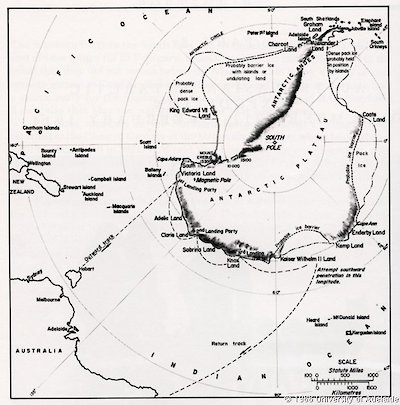The Australasian Association for the Advancement of Science
Mawson’s first concrete step back in his homeland was to enlist the support of the prestigious Australasian Association for the Advancement of Science. Mawson outlined his plans at a major meeting of the Association in Sydney in January 1911, with dramatic maps projected from lantern slides and compelling arguments stressing scientific, nationalistic, and economic gains, all packaged in a single bundle.
Mawson told his peers that ‘from a scientific point of view there is no other part of the Antarctic which so much deserves examination’. But it was not science simply for sciences sake: it was to be science serving the cause of economic gain.
‘There is considerable prospect of an economic return from whale and seal products and from guano and mineral wealth,’ he told his audience. ‘The geographical position of this land privileges Australians in taking advantage of its economic products, and renders the collection of scientific data therefore obligatory upon us.’
And finally, a call to patriotism. ‘No period in the history of polar exploration has been so favourable for the accomplishment of great achievements as in the present,’ he said.
The despatch of an Australian expedition will be an important episode in our history, for it is an undertaking which, at least, will stimulate the spirit of maritime enterprise; this is an indispensable element of national greatness.
If ever in the history of Australia an expedition is to set out under favourable circumstances, and with a future well assured of success, it must be immediate. No time is to be lost. So surely as it lapses for a moment, foreign nations will step in and secure this most valuable portion of the Antarctic continent for themselves, and for ever from the control of Australia.
Then the inevitable appeal to the wallet. ‘Many wealthy Australians,’ he said, ‘would not feel the loss of the whole amount [needed]. In smaller sums it would not require the co-operation of many individuals to secure the doing of deeds that would build for themselves an everlasting name, and produce books full of the stir and achievement of a new era of effort and progress greater than any in the past.’
His appeal had the desired effect. Three days later the association agreed to donate £1000, a third of its liquid assets, with the proviso that Mawson get Shackleton to agree that Mawson was ‘to be in supreme command and free from any control outside Australia’. Edgeworth David was appointed chair of a special AAAS committee, also including 18 scientists from NSW, Victoria and South Australia.

